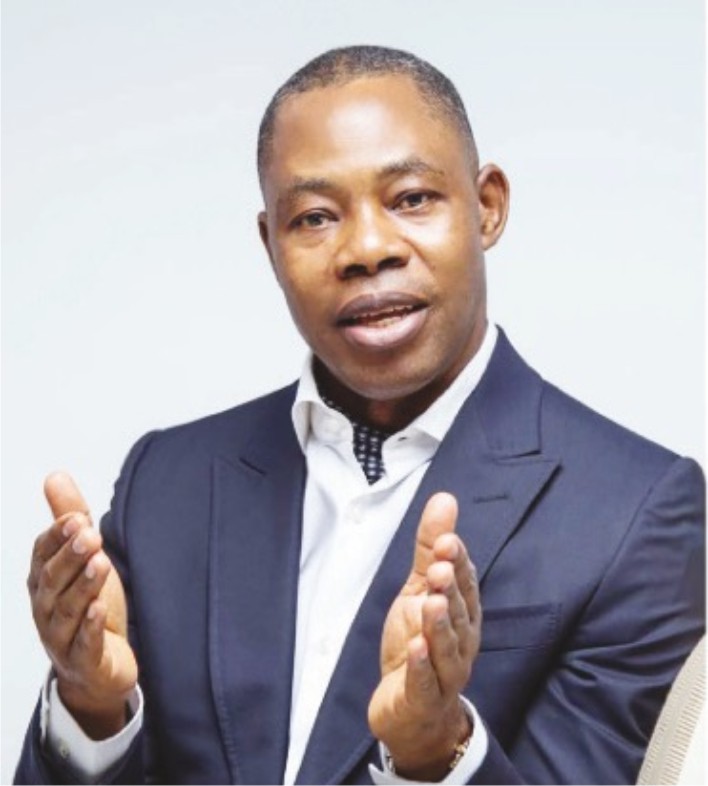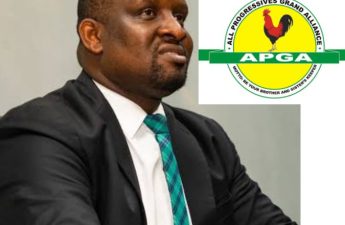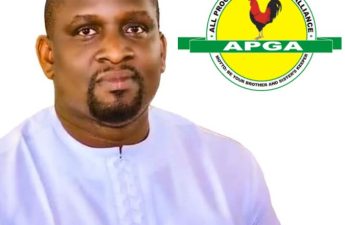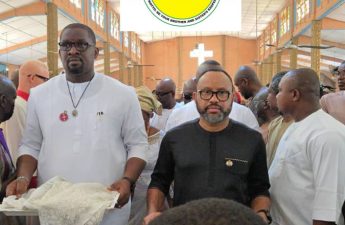The Deputy Chairman, House of Representatives Committee on National Security and Intelligence, Mr Adejoro Adeogun, talks about the proposed amnesty for Boko Haram insurgents, special fund for armed forces, state police and Operation Amotekun, in this interview with LEKE BAIYEWU
There is a bill at the Senate proposing a commission to rehabilitate and empower repentant terrorists, which has generated public criticisms. What is your opinion on the bill?
I want to believe that it is an exercise in futility. I think the Senate President (Ahmad Lawan) is allowing every legislator their liberty to exercise their rights to propose legislation, it does not mean that it will get the required support from the Senate or here (House of Representatives). Even if, peradventure, it passes through the Senate, I don’t think it will get the required support at the House of Representatives.
What are the specific issues you have against the proposal?
First, it is the idea that we want to reward criminals with nothing to encourage law-abiding citizens to remain so. Why do we need to establish a commission for repentant Boko Haram fighters? Who made them repentant? Who determines when someone is repentant? So, we might as well just wake up one day to say that we are going to have a commission for repentant armed robbers. I think that by Nigerian law as it is now, only a court can decide if someone has repented, not the police, military, Senate or the National Assembly. So, what I feel we should do is to have a commission that says when a (prosecuted) person has served their term, then the prerogative of mercy can follow. Why do we have the (Nigerian) Correctional Service? Let them go and repent in prison.
So, they must be punished first…
Of course! What is the greatest crime that you can commit against a country? It is treason. So, when you take up weapons to fight against your country, that is treason. And no man can forgive treason. So, let the person who has committed treason or a treasonable offence go to court, have their day in court, and after that, they can repent. You don’t repent without showing remorse.
What about insurgents who willingly surrender their arms and not captured by security operatives?
I still want you to look at it from the perspective of the armed robber. If a man robs a home and willingly submits what he has stolen and comes back to say, ‘I robbed and may have killed in the process,’ would you support that he should be forgiven? It is the same thing. I even think that treason is more felonious that armed robbery.
The House is also having a bill that will create a special five-year funding plan for the armed forces. Can you explain this?
It is a collective decision of all the security committees. The whole idea is that if we want to develop this country, the first thing to do is to create an atmosphere for business to grow and for people to do things that they desire to do, which means that we must secure the cities. The reality is that if you look at the Nigerian Constitution, there is only one provision in Section 14, which is that the security and welfare of the people shall be the purpose of government. And if for any reason government is unable to secure the cities, then it has failed. So, what the bill proposes is to have other sources of fund to build the capacity of the military and, maybe, other security agencies that provide intelligence, to be able to provide security for us.
When we are secure, we will be able to develop. There is no amount of money that you vote to the North-East now that can work because there is a war there. You cannot have development in an atmosphere of chaos. So, the whole idea is, ‘Let us take away the chaos first.’ And the bill says five years, not in perpetuity. After five years, it would be subject to review. And if it is no longer necessary, then it would be set aside.
Did the service chiefs demand for the special fund or did the sponsors of the bill choose to do so?
You are aware that shortly after we reconvened from recess, there were lots of motions in the National Assembly, even calling for a change of the service chiefs, and it was because people were disenchanted with the fact that where we seemed to have made gains, there seems to be reversals, and the fact that the security situation in the country was not moving in the direction that was desired. But then, after further investigations and interactions by the National Assembly, we found out that even if we change the heads of these agencies and still give them (new heads) the same tools, they probably won’t perform better.
It is like you having a cook and not having palm oil, and asking the cook to make soup. Even if you get 10 cooks, they will still make the soup without oil. So, the whole idea is to actually remove any excuses they could have, provide the funds, and help them to get equipment – apart from money – through parliamentary interaction with the United States Congress to at least remove the impediments to the procurement of weapons by Nigeria.
But the armed forces could have adequate equipment and weapons and the service chiefs would lack new ideas and political will. Is this not a valid point?
I gave the analogy of the cook in the kitchen. The first thing you will ask yourself is how to put the right things in place first, so that when you are making a change, you don’t give the new person an excuse to fail.
There were also (House of Representatives) members who asked for the account of the monies already allocated to the armed forces, while others asked why the military should need more money when they claimed to have decimated Boko Haram. Do you agree?
The first issue has to do with funds that were disbursed and it is basically not about budget because we were all part of the budgetary process, and you and I know that the budget for the military was inadequate. We must all realise that the best time to prepare for war is when there is peace. Because if you are not ready for war at the time of peace, when war comes, you’ll be caught unawares. That is why we are in this sorry state.
On the issue of decimating Boko Haram, I have had cause to say that the problem we have with the Federal Government in particular is communication – strategic communication failure. Have they decimated Boko Haram? I want to believe so and I will tell you why. You have a changing war. At some point before 2015, we had an insurgency during which some people took control of a part of the country. The moment they were chased out of that part of the country, the era of insurgency ended. For you to have insurgency, by global definition, they must take control of a section of the country. There was a de-escalation, which means you reduce from being the top to the next level, which is terrorism. Now, in converting to terrorism, you now have the issue of ISWAP (Islamic State’s West Africa Province).
They were having issues in northern Africa and as they were trying to establish cells in Africa. They found allies in the remnants of Boko Haram. So, what the military and the Federal Government should be communicating is this: ‘We have decimated Boko Haram but we have a new battle. Now we are fighting an invisible army that will come, attack and disappear – guerrilla warfare. They are not looking for territories, they just want to embarrass. That is one of the goals of terrorism; you want to embarrass (the government), you want to force the government into taking unpopular actions. It is aimed as causing embarrassment. Sometimes they want to get money, sometimes they want to gain attention but, basically, the whole idea is to make sure that there is no sense of security within the territory of northern Nigeria.
But why do some members of the House of Representatives from the North-East, especially from Borno State, still insist that some areas are not accessible to residents?
I can assure you that there are areas in the South-West of Nigeria that are (also) not reachable. You are aware that you need to be very bold to drive from Abuja to Kaduna. Why? It is because of banditry. There are so many places in southern Nigeria that people won’t go to because of banditry. So, if you have a similar case in the Borno, it is because there is proximity between Borno and the conclave of the terrorists. So, it is easy to say that. The fact that you are afraid does not mean that you are not directly in control of any territory.
The leadership of the Nigeria Police Force was at the House recently to demand more arms, ammunition, equipment, personnel and money but their critics have said the police rather need more of intelligence-based strategy and deployment of Information and Communication Technology. What do the police really need?
First, most people in the top hierarchy of Nigeria’s security forces underestimate the value of intelligence. We should invest in intelligence. Even investing in intelligence requires money because you have to buy the weapons for the intelligence. I know that one of the requests made by the police was to have 744 drones – which means they will have a drone for each local government area. I think it is a waste of money. How many drones do they have in the State of Israel? It is basically the Nigerian thing to say I want 100, believing that you may end up getting just 10. It is about resource sharing and acquisition.
But the truth is that the police are in need of help. They don’t have the adequate number and they don’t have the (right) training. What kind of weapons training do we give to our policemen? We take the regular policeman to the police college, give him 10 rounds of ammunition and that is all he is going to get as training. And he is not going to have any other training for another 10 or 15 years. Weapons training should be done every six months. But do the police have the capacity to do that? They don’t. So, you have policemen that are not trained and you expect them to perform magic. We must invest in the training of our policemen, in equipping them and providing support for them. And then, we must encourage all the intelligence agencies to improve on their intelligence gathering capabilities to provide support for the police. That is the only way we can make progress.
Some Nigerians strongly believe that the problem with the police has to do with structure and not about having all the equipment, personnel and funds. Should the NPF be decentralised to have state or community police?
We can decentralise with the same federal structure, which the police have tried to do by creating zonal commands with the DIGs and AIGs in charge. All they have to do is to create operational capabilities at the zonal levels. Do we have a need for state police? No. Look at what is happening in Edo State. The governor (Godwin Obaseki) says somebody cannot come into his state. If a governor can ask the national chairman (Adams Oshiomhole) of his party (the All Progressives Congress) not to come to his state when he does not have state police yet, (it shows) he can control the commissioner of police to obey an illegal order to stop somebody from coming. Then you can imagine what will happen when the governors have state police. They will misuse this; they will abuse the powers conferred on them.
The Nigerian politician is not mature enough to handle power, especially the power of life and death that comes with the state police. Also, how do you expect states that are already having difficulty paying salaries to handle the burden of funding state police? We would only end up grooming (criminals) among the corps of state policemen because most of them will put their officially issued rifles to use whenever the states are unable to pay them.
Has your argument not confirmed the fears of those criticising the South-West Security Network codenamed Amotekun?
It is the criticism of Amotekun by the northern youths, the Attorney-General of the Federation (Abubakar Malami, SAN) and people who are not within the sphere of influence of Amotekun, that gave Amotekun legitimacy. Amotekun was not popular in the South-West, but when the attacks came from outside, it became a collective resolve to ‘first of all chase away the hawk and deal with our chicken at home.’ Amotekun was not popular. Was there anything called Amotekun on the ground? No. It was a political thing.
There was a sense of nationalism among the people of the South-West because they felt that the attack was coming from outside. If they had not done that, Amotekun would not have gone as far as it has gone. But then, what is Amotekun? It cannot operate without the police. If Amotekun corps need to bear firearms, they will need to apply to the police. And I can assure you that in the next few weeks, the Firearms Act will be amended to make it even more stringent for people to bear arms. So, because the police will still be controlling Amotekun, it makes it easier to handle than to confer all the powers on the people.
Punch



